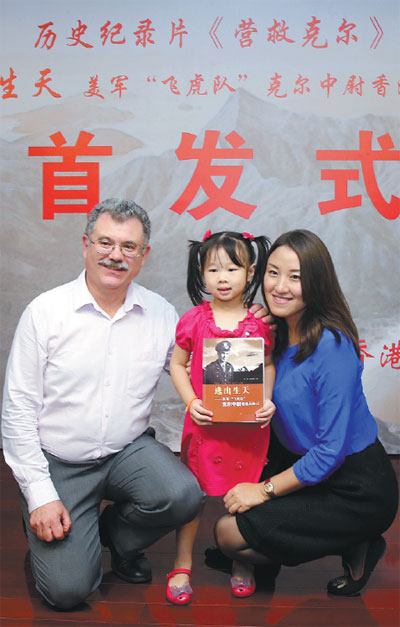In memory of China's foreign friends in WWII
- By Li Donglang
 0 Comment(s)
0 Comment(s) Print
Print E-mail China.org.cn, September 2, 2015
E-mail China.org.cn, September 2, 2015
|
David C. Kerr (left), son of Flying Tigers pilot Donald W. Kerr, poses with descendants of Chinese World War II veterans during a documentary and book launch in Beijing on Friday. [Jiang Dong / China Daily] |
During the Chinese People's War of Resistance against Japanese Aggression (1931-1945), a myriad of foreign experts and friends gave unstinting support in that critical period.
Far less well-equipped compared to the advanced Japanese weaponry, China won wide acclaim and sympathy from the international community for its steadfast fight for justice.
Foreign aid from China's friends
Foreign aid came in three forms.
The first was from international societies: the Communist International led by Georgi Dimitrov had called for the proletariat around the globe to support China ever since Japan occupied China's northeast provinces in 1931.
In 1938, a year after full-scale war began, a delegation led by James Klugmann comprising members of World Student Association for Peace, Freedom and Culture arrived in China seeking to grasp the actual situation. After the visit, team members reported on China's resistance to a number of foreign universities, including those of the United States, Britain, Canada, France, Belgium and Netherland.
Other humanitarian support came from a variety of organizations, trade unions and Red Cross societies in Britain and France. In those campaigns, a number of illustrious figures, including John Dewey, Albert Einstein, Roman Rolland, Bertrand Russell, Mahatma Gandhi jointly signed a statement criticizing Japan's invasion and called for the international community to halt economic cooperation with it.
The second kind of support came from foreign governments, mainly military aid. Prestigious generals, such as Joseph Stilwell from the United States and Georgi Zhukov from the former Soviet Union, were among about 1,129 foreign political and military figures who chose to stay in Chongqing (wartime headquarters of the Kuomintang) over a long period.
The third type of aid involved lots of foreign journalists, doctors and military officials, including Edgar Snow, Anna Louise Strong and Agnes Smedley, who stayed the hardships of the Chinese people. Through their writings, the atrocities of the Japanese militarists were exposed to the entire world. Meanwhile, the medical team consisting of doctors from Poland, India, Czech, Austria and Hungary tended to the needs of frontline soldiers.
There were some, such as the French doctor Jean Augustin Bussiere, who even endangered their lives seeking to evade Japanese blockades to get medicines for combatants.
In terms of wartime economic and cultural construction, a number of foreigners, such as Joris Ivens, a Dutch documentary filmmaker, Rewi Alley, a New Zealand born educator and author, and Norman France, a British born educator capable of speaking Mandarin and Cantonese also gave help during the war.
There were also a number of Japanese friends, including Sanzo Nosaka, Wataru Kaji and Koko Ikeda, who joined in the Chinese camp to fight against the aggression of their fascist countrymen.
To cope with refugees fleeing from their homes in Shanghai, the Red Cross built refugee camps. And there were also the Flying Tigers composed by many volunteer U.S. aviators who fought the Japanese invaders. Some foreigners, like Henry Norman Bethune, Dwarkanath Shantaram Kotnis and Grigori Kulishenko even sacrificed their lives.







Go to Forum >>0 Comment(s)